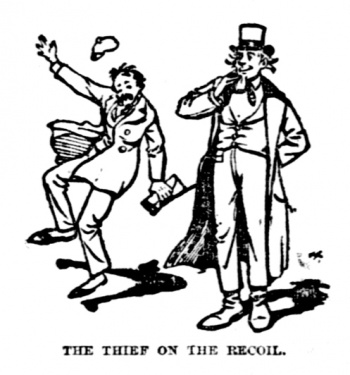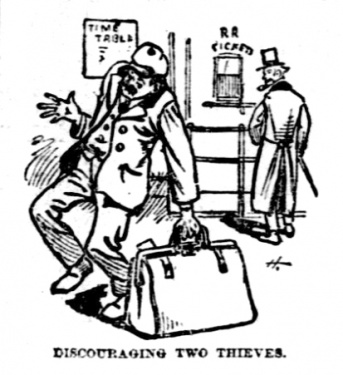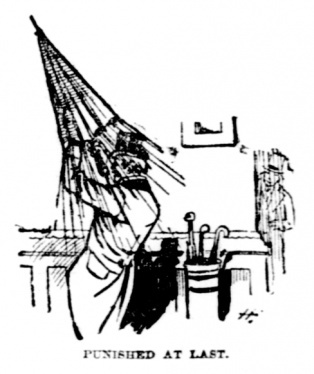The Old Age of Holmes
The Old Age of Holmes is an American Sherlock Holmes pastiche written by Charles W. Hooke (signed as Howard Fielding) published in various American newspapers on 2 december 1894.
Editions
- in The Cincinnati Commercial Gazette (2 december 1894 [US]) 3 ill.
- in The Nebraska State Journal (2 december 1894 [US]) 3 ill.
- in Rochester Democrat and Chronicle (2 december 1894 [US]) 3 ill.
- in The Galveston Daily News (2 december 1894 [US]) 3 ill., as Old Age of Holmes
- in The Times (Richmond, VA) (2 december 1894 [US]) no ill., as Old Sherlock Holmes
- in The Wichita Daily Eagle (5 december 1894 [US]) 3 ill., as Stealing A Story
Illustrations
-
The thief on the recoil.
-
Discouraging two thieves.
-
Punished at last.
The Old Age of Holmes

An Unauthorized Extract From the Diary of Dr. Watson.
Society to Reform Thieves
The Adventures of the Brass Watch, the Automatic Carpet Bag, and the Loaded Umbrealla.
The fact that my friend, Sherlock Holmes, was killed before reaching middle life did not, as the experienced reader will understand, prevent him from attaining a ripe old age. In order to be in line with the most popular detective fiction, I should, in fact, have killed him several times in the courses of each of the adventurer which it has been my privilege to chronicle. On the contrary, it has been my aim to distinguish these records from fiction, and to convince the reader that they are as near the actual truth as anything founded on a married man’s diary can be. Therefore, while making a slight concession to the general prejudice by injecting fatal doses of cocaine into Holmes on every possible occasion, I have permitted him to die only once.
My gifted friend is an old man now. His lofty forehead extends all the way around to his shirt collar behind; his few remaining teeth are tied in with string; but his eye is as bright as ever, and, with the aid of a little extra cocaine, he can still see things which are not present. With this brief introduction. I will proceed to relate a series of incidents not intended to form a connected narrative, but simply to throw light upon my remarkable friend’s character, as it has developed in these later years.
Referring to my diary I find that it was in the fall of 1913. Holmes, by the continued exercise of his rare intellectual faculties, had remained a bachelor. He had the old rooms in Baker street, where the landlord, being quite deaf, did not object to Holmes’ performances on the violin. It was late in the evening, and I was dozing before my stove, when a ring at the bell called me to the door. Holmes entered.
"Ah, my dear Watson," he said, "can I intrude upon your leisure for a few minutes?"‘
I assured him with an Englishman’s politeness that his company was better than none at all.
"So you’ve been smoking, have you?" he said, as he treated himself in my office.
"My dear fellow," I cried, "how is it possible for you to know that?"
"It is perfectly simple," he replied; "‘there is a strong odor of tobacco in the air. Now, as I happen to know that you and Mrs. Watson are the only persons in the house, what follows? It is true that your stove smokes, but it does not smoke tobacco. So you see that, though seemingly complex, the problem is easy."
"To be sure it is," I rejoined, quite vexed at my own stupidity.
"Ah, my boy." he said, "I fear that I make a mistake in giving explanations. They destroy the magic of the thing. But they fill space, and, at a guinea a word, that is worth considering. And now to the point. Can you go to New York with me?"
‘Why certainly," I hastened to say. "My neighbor, the doctor, is as accommodating as ever. He will take my practice for a few months, and my patients will not be much worse off than they are now. When shall we sail? And what is the case?"
"We shall sail at once'" he said, "and as for the case, it concerns the Society for the Discouragement of Thieves."
"I never heard of it."
"Perhaps not. I am its president, and, in fact, its only member at present. I have been unable to find anybody else who could be admitted without decreasing by one the number of persons whom the society is organized to discourage. That, of course, would not be desirable."
"And you intend to admit me?"
"My dear Watson, when you give up the regular practice of your profession we will consider that question. Will you come with me to New York? There I expect to find thieves who really need to be discouraged. They have been having things all their own way for three hundred years, since the island of Manhattan was stolen from the Indians."
"I’ll be ready in two minutes," said I. "Let me mention to my wife that I’m going. She never objects, you know. In fact, a reader of these chronicles once suggested that she seemed anxious to get rid of me."
Our voyage across the Atlantic was uneventful, except that it served to initiate me into the workings of the society. Its purpose, as Holmes admitted, was almost purely amusement. He had amassed an enormous fortune by his profession, and was no longer compelled to do detective work for pay. His services to the Prince of Wales — chronicled in "The Adventures of the Thin-Edged Deal-Box" — put him in a position of independence before the close of the last century. He now returns his vast talent to the beneficent task of making life uncomfortable for thieves, through the medium of simple tricks devised by his powerful imagination. Holmes handles a pack of cards in a way to make the king of diamonds wink his other eye, and he discouraged a large number of thieves around the card tables in the smoking-room before we reached New York.
Our first considerable adventure in the metropolis of the new world occurred on a Fourth avenue car on the third day after our arrival. We stood on the front platform as the car bowled along. Suddenly Holmes touched my elbow with an imperceptible gesture.
"You observe," he said, "the gentleman in checked pantaloons waiting at the next crossing. He will board the car, and will stand with us on the platform."
No sooner had my companion spoken these words than the man whom he had indicated raised his hand and signaled to the driver to stop the car.
"Holmes, this is marvelous," I whispered. "How did you know that he would do that?"
"The fellow is a thief," replied Holmes. "Anybody could deduce that from the obvious fact that he has got along well in New York. His attire told me that. Seeing that he was a thief, I took this" ? here he showed me a large and handsome watch ? "from my pocket, while the man had his eye upon us. He will board the car with the intention of taking it.
Holmes wound the watch in an ostentatious manner, and replaced it in his waistcoat pocket. He then stared up at the top of the buildings. I kept my eye on the stranger and in a few minutes had the pleasure of seeing him deftly abstract the watch from Holmes’s pocket. No sooner had he taken it than a bell inside of it began to ring with a noise like fifty alarm clocks. The man was so startled that he forgot to put the watch into his pocket. He stood and stared at it. Whereupon the watch’s case parted and the works fell out. They consisted of a large steel spring and a bell such as is used on alarm clocks.
"The watch is made of brass," said Holmes as we gathered up the remains of the thief from the platform. "It is a very simple device but somewhat surprising in its action. I do not wonder that the shock has proved too much for our friends here. Let us hope that when he recovers he will see cause to adopt a better mode of life."
Holmes parody pocketbook scamIt may well be imagined that, after this amusing incident, I kept close to Holmes during all his rambles through the city. We were frequently disguised as visitors from the rural districts. On such occasions Holmes was always provided with a large, black leather pocketbook, which protruded conspicuously from the side pocket of his coat. A stout elastic band was fastened to it, and the other end of the band was secured to a strong belt around Holmes waist. Nothing could be more amusing than to see a member of the light-fingered fraternity seize the pocketbook and rush away The band would stretch to a length of nearly a rod. and then it would bring the thief back with the velocity of a shot out of a gun. for not one of them ever failed to hold on to the pocket book. Holmes always braced himself for the shock, and received the thief in his arms on the recoil. Some of his brief homilies on such occasions were models in their way.
When he tired of the pocketbook trick, he would frequently stroll into the Grand Central railroad station with a large carpet beg. This he would place upon the floor while he went to the window and made a pretense of purchasing a ticket. The bag contained self-acting machinery which drove two strong screws into the floor the instant it was set down. It never could remain upon the floor more than two minutes before one of the gentlemanly fellows who are always waiting there to welcome the coming and speed the parting jay, would grab it and attempt to hurry away. The chances were that he would catch the handles "on the fly," as they say in America, find that the unexpected resistance would cause him to turn over as neatly at if he had been brought up in a circus.
Holmes parody suitcase scam"This device," Holmes said on the first occasion of its use. ‘"has enabled me to discourage two thieves at once."
"My dear Holmes,"‘ I replied, "how do you make that out? I only observed one."
"Ah, my dear Watson," he rejoined, "how often must I tell you that your observation is defective. Did you not see that I pretended to buy a ticket?’
"Yes."
"And I didn’t do it?"
"Certainly not."
"Well, such conduct as that discourages the New York, New Haven & Hartford Railroad Company."
"Just like my stupidity,"‘ I exclaimed. "I saw only the thief who attempted to steal your bag."
"He was very small potatoes compared to the other one," said Holmes, as he set the bag again, and walked back toward the window.
I think the neatest of his games, and the one which will be the most generally appreciated since it deals with the oldest of crimes, was played while we were at a millionaires’ luncheon club downtown.
As we sat at the table Holmes directed my attention to a gentleman of imposing appearance who was lunching near us.
"You would not suppose." said Holmes to me, "that that man, so eminently respectable in appearances was to be the next victim of the society."
"I will bet you five to one," said the gentleman who had invited us to the club, "that he will not be the victim of anybody or of anything. That’s old Sam Rhodes, and he’s been in Wall street forty years. He’s been the controlling spirit in more than a thousand railroad deals, and it is estimated that if all the rope with which despairing stockholders have hanged themselves on account of Sam Rhodes were joined in one piece it would reach around the world twice and tie a double bow-knot."
"And he has never been punished for any crime," said Holmes.
"Punished!" cried our host, "why he’s worth $40,000,000."
"His time has come," said my friend impressively.
We watched Mr. Rhodes while he finished his lunch. When he rose, we followed him, obeying a sign from Holmes. The millionaire went out into the vestibule of the club where the hats, coats and umbrellas of the members were left while they wore at luncheon.
Mr. Rhodes selected his hat and coat.
"Did you have an umbrella, sir?" asked one of the attendants. "It’s raining outside, sir."
"Eh? Umbrella? Certainly, certainly," said Rhodes.
He hastily selected one from the rack.
Holmes clutched my arm. The millionaire hurried out upon the steps. He opened the umbrella over his head.
Holmes parody umbrella scamAbout a quart of some dark substance, which I took to be ink, fell out of the umbrella upon Rhodes’ head, and at the same time a thin stream of the same fluid trickled out of a hole in the handle and went up Rhodes’s sleeve.
"Will you claim the umbrella?" I whispered to Holmes.
"Not just now," he responded in the same guarded tone. "Mr. Rhodes is a very large man, and from his language and demeanor at this moment I judge him to be of a violent disposition. I am not so young as I was, and perhaps it would be safer not to introduce myself just now."
We went to the club’s smoking-room, where our host insisted upon opening a bottle of champagne. The mystery in the affair which I had just witnessed weighed heavily upon me. and I could not resist the temptation to ask Holmes for an explanation.
"How is it possible,'" said I, "that you I were able to predict with certainty that Mr. Rhodes would steal an umbrella, and not only that, but that he would take yours?"
"It was perfectly simple," said Holmes. "I had bribed the attendant not to let anybody else have it. As for Rhodes’s desiring to take it. I have only to say that it was the best-looking umbrella in the rack.
"So you see I had laid out the whole thing in advance, and that is the whole secret of this detective fiction. It is easy enough for the detective to find the criminal. He is in the confidence of the author who controls destiny as I did in this case. But in real life the detective is obliged to contend against the disadvantage of having to find out about it. Thus but two courses are usually open to him. One is to do nothing but draw his pay, and the other is to convict the first man he can get hold of, whether he is guilty or innocent."


